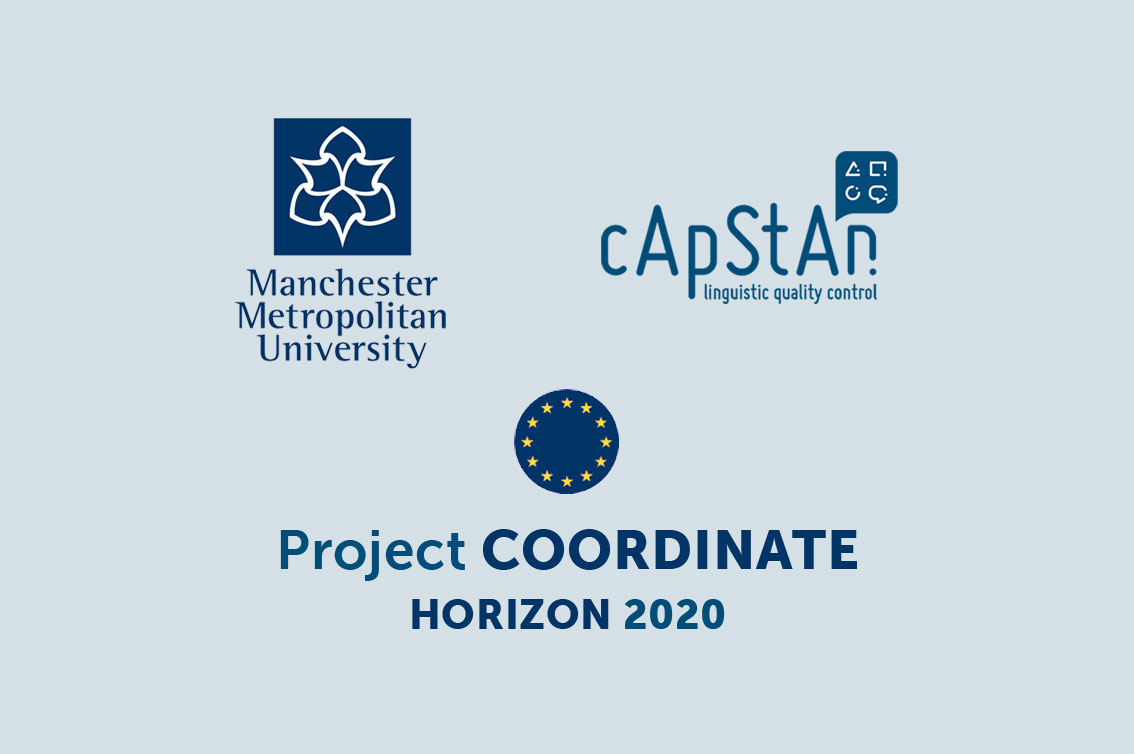
New Community of researchers working to improve child wellbeing
Project COORDINATE
COhort cOmmunity Research and Development Infrastructure Network for Access Throughout Europe
Manchester Metropolitan University will lead an international project that will transform young people’s life chances
cApStAn will intervene at various points in the workflow to monitor and report compliance with translation requirements. These quality assurance steps will occur in collaboration with national teams: the aim is to achieve comparability while building consensus.
COORDINATE will:
- Facilitate improved access to existing survey data on child wellbeing
- Extend the Growing Up in Digital Europe (GUIDE/Eurocohort) survey network
- Initiate the GUIDE survey with a large-scale cohort pilot survey using a harmonised instrument and research design in key European countries
How COORDINATE will Improve child wellbeing
- Initiate a community of researchers working to enhance child wellbeing
- Begin the first ever Europe-wide birth cohort survey to track children’s wellbeing as they grow up
- Ensure that high quality survey data will inform policies that directly affect children’s lives
Giving children a voice in research that concerns them
COORDINATE will establish Youth Advisory Boards (YABs) in the UK, Portugal, Croatia, and Finland to engage young people at all levels and stages of the research. The YABs will overview and advise researchers on key questions regarding the project.
Developing research capacity across Europe
COORDINATE will facilitate improved access to existing survey data on child wellbeing, increase longitudinal survey capacity across Europe through webinars, summer schools, and grants for trans-national visits, extend the GUIDE survey network, and initiate the GUIDE survey with a large-scale cohort pilot survey in Croatia Finland France and Ireland.
Led by Professor Gary Pollock of Manchester Metropolitan University’s Policy Evaluation and Research Unit and Associate Professor Jennifer Symonds of The Geary Institute at University College Dublin, COORDINATE has been awarded €5 Million funding by the European Commission’s Horizon 2020 to undertake a range of activities that will build the capacity and infrastructure to collect and use longitudinal survey data to improve child wellbeing across Europe.
Prof. Pollock “The seismic effects of the COVID-19 crisis on young people’s education and mental wellbeing underlines the importance of understanding how policy decisions made today affect them in the years to come. In the UK, we have witnessed huge changes to their daily lives, from home-schooling to changes to exams and ongoing issues over the extension of free school meals.“
Assoc. Prof. Symonds “A Europe-wide birth cohort survey will allow policymakers to access large amounts of data on measures of young people’s health and wellbeing, such as stress at school and happiness in the home, and how these are affected by decisions they make at different stages of their young lives. We believe that this will give children a louder voice in the conversations about issues that affect them“.
Prof. Pollock “We are delighted to be awarded funding to take another step closer to the delivery of Europe’s first birth cohort survey, and to lead the next stage of this important project here at Manchester Metropolitan.”
Steve Dept (founder of cApStAn) “A remarkable collective effort to work at the cutting edge of survey methodology and translation processes. Survey instruments will be adapted to be culturally sensitive yet comparable for each member state.”
COORDINATE is the next phase of the GUIDE project funded by the Horizon 2020 programme in recognition that policymakers across Europe are currently unable to draw upon consistent, comparable and high quality data on child wellbeing to inform policy.
GUIDE will be an important source of evidence in developing social policies for children, young people and families across Europe for many years to come. It will be an accelerated cohort survey including nationally representative samples of new born babies and school age children. With two cohorts taking place in parallel it will be possible to make cohort comparisons early in the life of the survey.
Why policy-makers value longitudinal surveys
Longitudinal surveys routinely inform policy development. Longitudinal data is important as it can be used to show how the experiences of different cohorts of people vary over their life course. GUIDE offers policy-makers the following:
- Unique insights into key transitions in children’s lives
- The ability to make international comparisons on child and youth wellbeing
- Opportunities to evaluate the impact of policies over time
For more information about, GUIDE, please visit: https://www.eurocohort.eu
For an animation on the importance of a Europe wide birth cohort survey visit:
https://www.eurocohort.eu/news/eurocohort-now-explained-in-a-short-animation/id/165
| 1 | The Manchester Metropolitan University (Coordinator) | GB |
| 2 | University College Dublin, The Geary Institute | IE |
| 3 | Consortium of European Social Science Data Archives, European Research Infrastructure Consortium | NO |
| 4 | Institut Drustvenih Znanosti Ivo Pilar | HR |
| 5 | Universidad Pompeu Fabra (Pompeu Fabra University) | ES |
| 6 | Institut national d’études démographiques | FR |
| 7 | University of Essex (The Institute for Social and Economic Research) | GB |
| 8 | Znanstveno-raziskovalno središče Koper | SI |
| 9 | Europaisches Zentrum Fur Wohlfahrtspolitik Und Sozialforschung (European Centre for Social Welfare Policy and Research) | AT |
| 10 | ISCTE – Instituto Universitário de Lisboa (Centre for Research and Studies in Sociology) | PT |
| 11 | Helsingin Yliopisto (University of Helsinki) | FI |
| 12 | Alma Mater Studiorum- Università di Bologna | IT |
| 13 | Stichting CentERdata | NL |
| 14 | University College London (Centre for Longitudinal Studies – CLS and Cohort and Longitudinal Studies Enhancement Resources – CLOSER) | GB |
| 15 | Koninklijke Nederlandse Akademie Van Wetenschappen – KNAW (Generations and Gender Programme – GGP) | NL |
| 16 | Gesis-Leibniz-Institut Fur Sozialwissenschaften Ev (Leibniz Institute for the Social Sciences) | DE |
| 17 | Ipsos GmbH | DE |
| 18 | TNS UK Ltd (Kantar Public) | GB |
| 19 | cApStAn SA | BE |